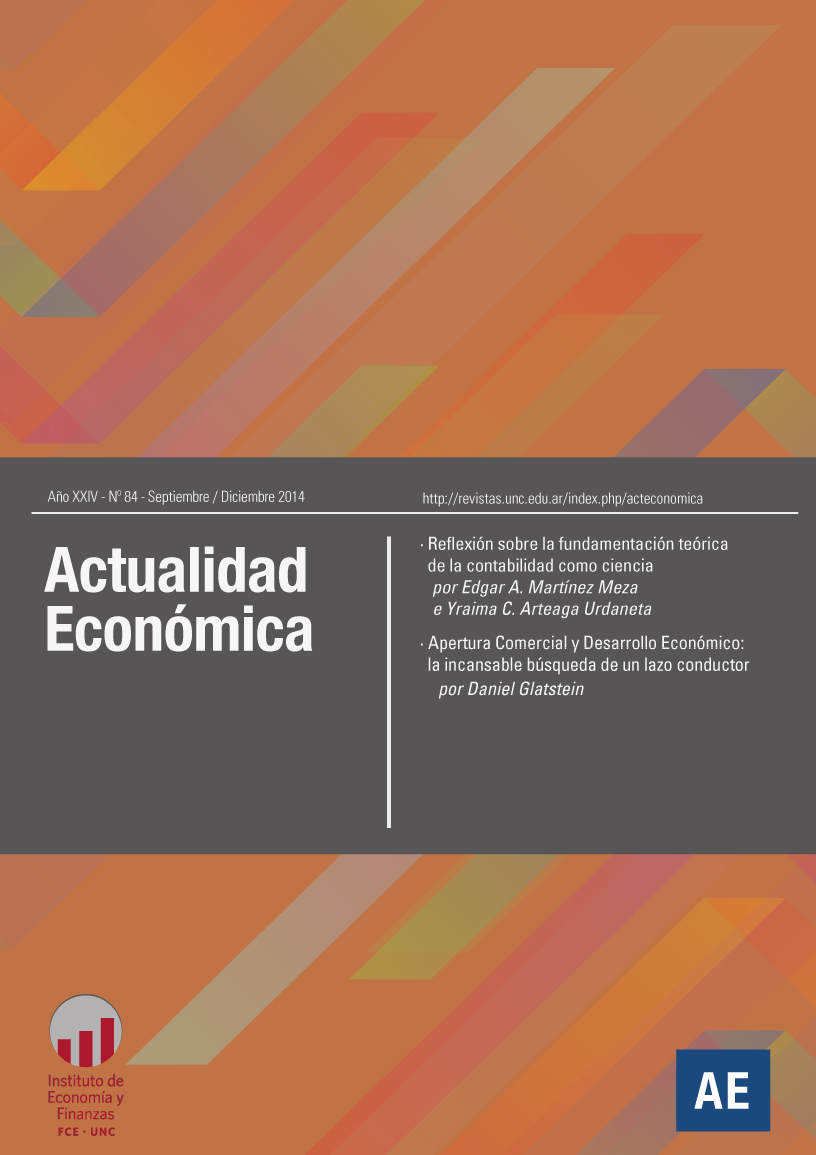Reflection on the theoretical basis of accounting as a science
Keywords:
accounting, science, epistemology, empiricismAbstract
Accounting and its current discourse for some researchers of the subject shouldn’t be considered a science nor theory given that the use of their conceptual bases its limited to the simple application of rules and procedures, ensuring strict compliance with international precepts which aim is to delimit their actions. Professionals on the accounting subject seem to focus their efforts to become bookkeepers exclusively, i.e., they base their commitment to the implementation of its instrumental rationality, to preserve their identification processing, measurement and communication of quantitative information status, on the search to preserve its system of financial information efficient status; we infer that this way they try to preserve their existence and permanence in life making it a way of generating income as a basis for the livelihood of their family environment. Satisfy companies in their need for accounting information, which leads to accounting to be-seem like a simple mechanical process. This essay aims to analyze the theoretical- epistemological position of science researchers, the use of elements of the natural sciences for the construction and reconstruction of the conceptual structure of the social sciences, and the discourse of the scientificity of accounting.
Downloads
References
Aristoteles (1999). Metafísica. México: Editorial Porrua.
Bachelard, G. (1972). La formación del espíritu científico. Siglo XXI Argentina editores S.A. Buenos Aires – Argentina
Bunge, M. (1989). La Investigación Científica. Su Estrategia y su Filosofía. Editorial Ariel S.A, Barcelona.
Garcia C, C. L. (2002) “El problema del uso de modelos en la contabilidad”, Revista Internacional Legis de Contabilidad y Auditoría n.º 12, octubre-diciembre, pp. 199-236.
Gramsci, A; (1970). Introducción a la filosofía de la praxis, (documento en línea). Disponible: http://www.vlises.tel.uva.es/uploaded-files/6B-2.pdf (Consulta 07 de Marzo de 2004).
Méndez, E. (2003). Como no naufragar en la era de la información, Epistemología para Internautas e Investigadores. Editorial de La Universidad del Zulia (Ediluz Venezuela,).
Kuhn, T. (1998). La estructura de las revoluciones científicas. Fondo de Cultura Económica Ltda. Santa Fé de Bogotá Colombia.
Mardones, J; Ursua, N. (1982). Filosofía de las ciencias humanas y sociales. Materiales para una fundamentación científica. Editorial Fontamara. Barcelona, España.
Martínez, E. (2002). El Positivismo. Trabajo presentado en el seminario de Epistemología de las Ciencias Contables, Maestría en Ciencias Contables, Universidad de los Andes (ULA).Venezuela.
Suárez Trujillo M. (2003) Introducción a la Epistemología. (Mimeografía).
Rusque, A. (2003). De la diversidad a la unidad en la investigación cualitativa. Editores Vadell Hermanos. Valencia – Venezuela
Tua, Pereda J. (1995). Lecturas de Teoría e Investigación Contable. Ediciones Gráficas, Centro Interamericano Jurídico-Financiero., Medellín Colombia.
Tua, Pereda J. (1983). Principios y normas de contabilidad. AECA. Madrid.
Popper, K. (1994). Conjeturas y refutaciones. PAIDOS. Barcelona.
Lakatos, I. (1983). La metodología de los programas de investigación científica. Alianza Editorial, Madrid.
Popper, K. (1982). La lógica de la investigación científica. Editorial Tecnos, Madrid.
Requena, J. (1981). Epistemología de la contabilidad como teoría científica. Universidad de Málaga, Málaga.
Downloads
Published
Issue
Section
License
Those authors who have published with this journal, accept the following terms:
Authors will conserve their copyright and guarantee the magazine the right of first publication of their work, which will be simultaneously subject to the Creative Commons Attribution-NonCommercial-NoDerivative 4.0 International License that allows third parties to share the work as long as the author and first publication of this magazine are indicated.
Authors may adopt other non-exclusive license agreements to distribute the published version of the work (e.g., deposit it in an institutional telematic archive or publish it in a monographic volume) provided that the initial publication in this journal is indicated.
Authors are allowed and encouraged to disseminate their work through the Internet (e.g., in institutional telematic archives or on their website) before and during the submission process, which may lead to interesting exchanges and increase citations of the published work. (See The effect of open access)









